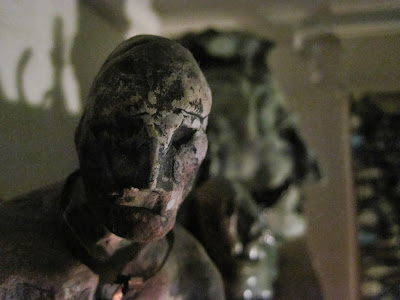Here's a slightly apologetic line from Rebecca Solnit's excellent
A Book of Migrations: Some Passages in Ireland that matters to me, that provides a focus, a model, an admonition, and some solace:
"I tried to use the subjective and personal not to glorify my mundane autobiography but as a case study in how one can explore the remoter reaches of the psyche by wandering across literal terrain."
My tuning fork, my compass needle. I use personal anecdotes in class--yes, a lot--but for the same reason that Solnit uses her own subjective journeys, her own experiences and reflections. I adhere to the principle behind that "case study" approach, for my heart declares even the "mundane" matters, if your "aim is true" (to borrow from Elvis Costello) and if you tell it right.
As a reader, a teacher, and a maker in particular, I add a second continent to her phrase, much as Solnit herself does in actual practice, joining such "wanderings across literal terrain" to explorations of the literary terrain. Both matter so much to me, but reading richly is a crucial key to the lock of life's treasure chest I've found. Picture the scholar as a Robin Hood, stalking the forest of words, as a pirate, navigating the shoals of the soul: silly, true images. (Even Bilbo Baggins was a burglar, remember.)
The Commonwealth of Letters, to use an old phrase, is a vast expanse, often quite civilized, often still savage. The pathways are not all paved, and the way isn't always clear, despite all those who have gone exploring before you. On such a journey, there will be pubs and palaces as well as pitfalls: famine, drought, lacerations of the soul. Persevere. If you are lucky, you'll find treasure; luckier, dragons.
No passport necessary beyond literacy; no invitation needed beyond your own curiosity.
Start wandering. When you get back, start talking.











































